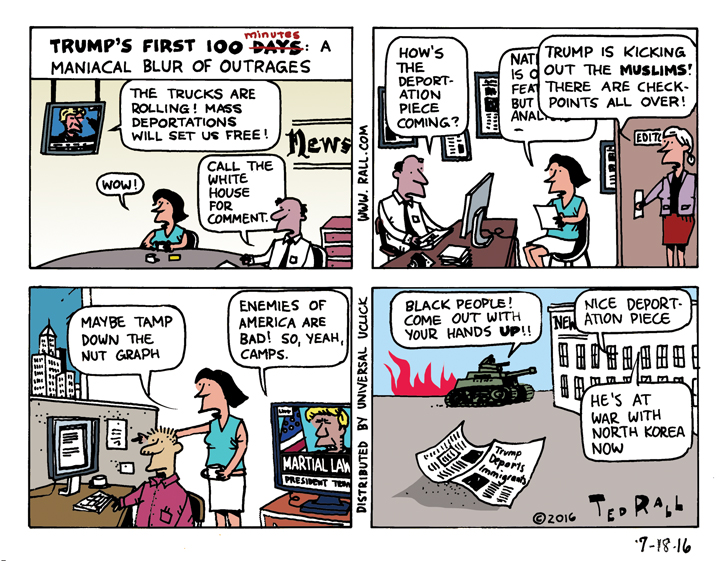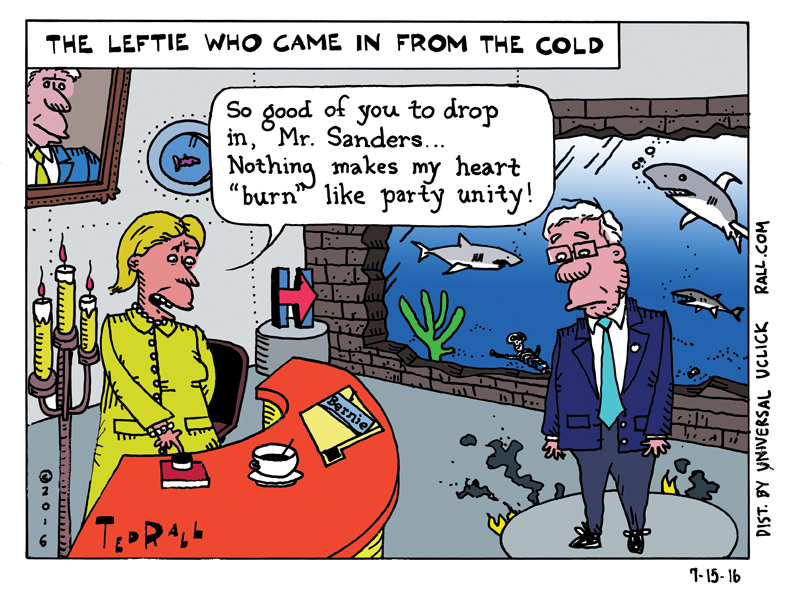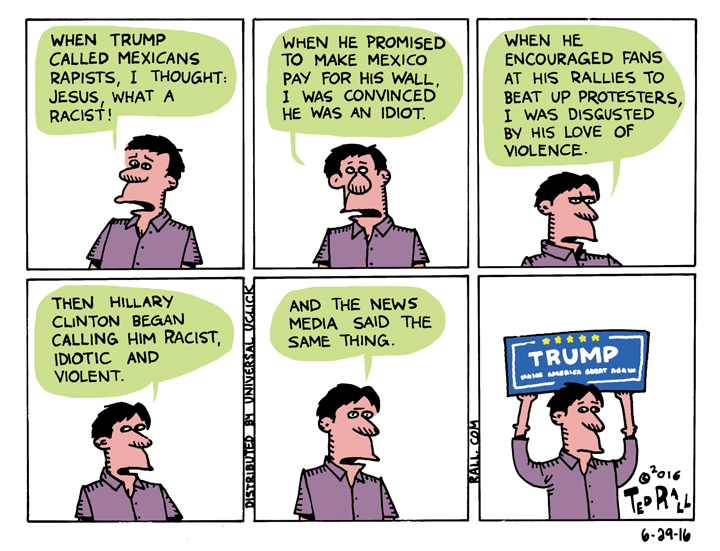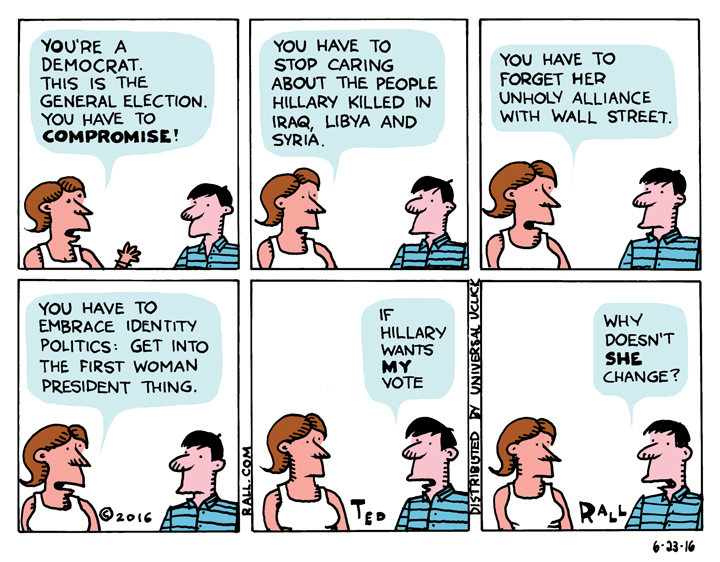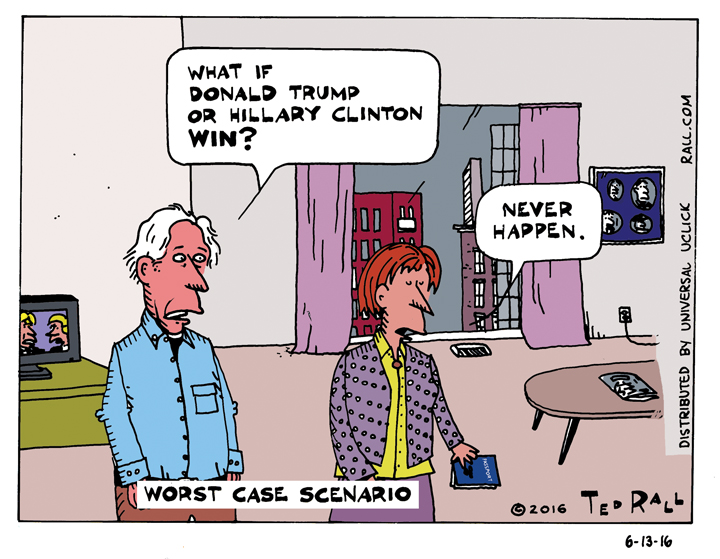Trump’s political genius is centered around his manic style. He issues one outrageous statement after another, so that the media and critics can only begin to respond to each before it gets eclipsed by the next one, with the net effect that nothing ever gets fully processed. If elected president, he’ll probably do the same thing. Hey, it worked for George W. Bush!
The Leftie Who Came In From The Cold
After a hard-fought primary campaign, Bernie Sanders capitulated and endorsed his rival Hillary Clinton for the presidency. In the final analysis, Clinton gave up little more than lip service to Bernie’s agenda of a $15 minimum wage, free college tuition at public universities, and universal healthcare. To the contrary, Clinton is now moving to the right, considering a general as vice president and asking the platform committee not to oppose the TPP free trade agreement.
Ameresia
Republican leaders who are uncomfortable with Donald Trump as their presidential nominee keep urging Trump to act more mature and respectable on the campaign trail. It probably won’t happen. But even if it does, how can they forget the outrageous things he already said and proposed? How can we voters? Not that Hillary Clinton is any better.
SYNDICATED COLUMN: Who’s Really To Blame for Brexit (and Trump)
 At this writing, securities markets and the international community are reeling at the news that British voters have opted to leave the European Union. The “Brexit” has provoked angry reactions from the pro-Remain camp, who accuse Leave voters of stupidity, shortsighted ignorance and, worse, thinly-disguised racism and nativism posing as nationalism.
At this writing, securities markets and the international community are reeling at the news that British voters have opted to leave the European Union. The “Brexit” has provoked angry reactions from the pro-Remain camp, who accuse Leave voters of stupidity, shortsighted ignorance and, worse, thinly-disguised racism and nativism posing as nationalism.
Political analysts point out that British voters were divided geographically – Scotland wanted to stay, England wanted to leave – as well as demographically. One chart that managed to go semi-viral online displayed high support for the Brexit among older voters, opposition among the young, alongside the actuarial average years remaining that each age group would have to live with the consequences of the vote. The smartest of these pundits focus on the class divide between shiny expensive youth-oriented cities like London, where pro-European sentiments are strong, and England’s version of the Rust Belt, abandoned hellholes where citizens barely subsist in a ruined landscape of shut down factories and widespread unemployment.
“If you’ve got money, you vote in,” a voter in Manchester told The Guardian. “If you haven’t got money, you vote out,” she said.
Amid all the concern about a collapsing British pound and the possible dissolution of not only the European Union – looks like France and the Netherlands may have a similar plebiscite in the near future – but also the United Kingdom, everyone’s out to cast blame. However, no one is pointing at those who are most responsible if (and it’s far from certain) Brexit leads to an economic downturn and/or a political debacle: the West’s incompetent political class, and its idiotic enablers in the corporate media.
The postwar order began to fray during the 1970s, when business leaders and their allies in government started to push aggressively for policies that encouraged the transfer of manufacturing industries to the developing world away from what was then called the First World in preparation for what we now call the information economy. Globalization is the shorthand term for deindustrialization – some call it outsourcing, others prefer the simpler “shipping jobs overseas” – and digitalization of culture and intellectual property.
This essay isn’t about whether globalization is good or bad. It’s about the way a trend that has been consistently declared irreversible has been poorly managed. That mismanagement led to the Brexit, and may elect Donald Trump.
Even during the 1970s, globalization’s downward pressure on wages was easy to foresee. Capital was becoming increasingly fluid, crossing borders with incredible ease in search of places and people where the production of goods and services could be done as cheaply as possible. If you own a factory in Michigan, and you can figure out a way to transport your product to market at reasonable cost, doing the patriotic “made in USA” thing feels like leaving money on the table when you consider what your expenses would look like in Vietnam or Indonesia.
Workers, on the other hand, are confined by international borders, linguistic and cultural limitations, family ties, and just plain inertia, to the nations — and often the regions within those countries — where they were born. If the highest wages in the world are paid in the United Arab Emirates, you can’t just hop on a plane and expect to find a job, much less a work permit. Workers are stuck; capital moves freely. This economic imbalance between labor and management is a significant contributing factor to the decline in real median wages in countries like Great Britain and the United States since the 1970s.
Now let’s say that you’re a high-ranking member of the ruling class: a Fortune 500 CEO, a head of state, a congressman, the publisher of a big-city newspaper. You don’t need a major in history or political science in order to anticipate that subjecting tens of millions of people to long-term unemployment and underemployment is a recipe for social dysfunction and the kind of class resentment that can be exploited by a demagogue or radical populist movement.
You can do one of two things with that knowledge. You can ignore victims of economic dislocation. Or you can help them.
If you ignore them, if you greedily grab up every dollar and pound and euro you can while city after city slowly collapses into alcoholism, drug abuse and rising crime, you know you’re setting yourself up for a future of political instability. It may take a long time, but the chickens will come home to roost. When things turn ugly, it could cost you a pile of cash you amassed during your orgy of greed.
That’s what happened during the 1980s, when Margaret Thatcher and Ronald Reagan dismantled the post-World War II social safety nets. Precisely at a time when the UK and the US needed more welfare, national healthcare and public education programs, they slashed them instead. Those austerity policies continued under Tony Blair, Bill Clinton, David Cameron, and – against reason and common sense – under Barack Obama after the 2008 economic meltdown.
The British and American political classes made a conscious decision over the last 40 to 50 years not to lift a finger to help those who lost their jobs to deindustrialization and globalization. Go back to college, they say. Get retrained. But most Americans can’t afford college tuition — the jobless least of all! We need(ed) a GI Bill for the dispossessed.
Even this week, many establishment types continue to criticize aging pensioners and unemployed workers over age 50, denigrating them as selfish, clueless, unwilling and unable to adapt themselves to the new – brutal – world in which we find ourselves.
No doubt: nativism and racism played a role in the Brexit vote. England is an island nation with an island mentality. Though only a few thousand Syrians entered the UK last year, with nary a passport check, images of refugees riding the roof of trains from France through the Chunnel felt like an invasion to some Britons. But bigotry shouldn’t let us ignore the economic factor. When jobs are plentiful and salaries are rising, no one minds immigration. Xenophobia grows in the soil of scarcity.
What did the elites think? Did they really believe it was possible to make so many people so desperate and so angry for so long without a risk of them lashing out?
Donald Trump is not a brilliant man. But the political classes could learn a lesson from him. He knows that an awful lot of people are angry. And he knows why.
(Ted Rall is the author of “Bernie,” a biography written with the cooperation of Democratic presidential candidate Bernie Sanders. His next book, the graphic biography “Trump,” comes out July 19th and is now available for pre-order.)
Why Doesn’t She Change?
Supporters of Hillary Clinton tell the progressive supporters of Bernie Sanders that they have to change their politics, or compromise them, or ignore them, in order to join them in their fight to defeat the dangerous Donald Trump. But no one seems to ask: if Hillary Clinton wants our votes, why doesn’t she change her politics to suit us? Isn’t that what politicians do? Instead of pandering to the people, she panders to corporations.
SYNDICATED COLUMN: Mass Shootings Are The New Normal. Get Over It.
 What is wrong with Americans?
What is wrong with Americans?
Okay, that’s a very open-ended question with many potential answers.
What I’d like to talk about this time is: why is it that Americans only begin to get serious about a problem after it’s too late to solve it?
Currently, I’m thinking about the latest, depressingly predictable response to the Orlando massacre.
As usual, right-wingers like Donald Trump want to restrict immigration. But even setting aside the obvious moral and practical economic objections to nativism, how would that prevent future mass shootings (in part) in the name of the Islamic State? Orlando shooter Omar Nateen wasn’t an immigrant. He was born in Queens, New York; his parents were from Afghanistan. If the Republicans’ goal is to get rid of potentially self radicalized Muslims, it’s too late. There are 3.3 million Muslims in the United States. Many are full-fledged citizens.
Any group of people that numbers in the millions includes some who are mentally ill, some who are politically radical, some who are religious fundamentalists, and some who are some combination of all three. Since it’s illegal to deport U.S. citizens, millions of whom are Muslim, a few of whom are crazy – and the United States insists on pursuing an endless “war on terror” against Muslim countries – there’s no way that a policy of reduced immigration can prevent future attacks by homegrown Islamists.
On what passes for a Left, Democrats like Hillary Clinton are pushing for tighter restrictions on guns. As usual.
Indeed, it’s hard to argue that civilians require military grade weapons like the semi-automatic AR-15 assault rifle used to kill 49 people at the Pulse nightclub. Hunters don’t use them. If the AR-15 is legal, why not hand grenades? Had Nateen been forced to use a pistol or long gun instead, his bullets would have been smaller, the death toll lower. Some of his victims might have been able to overpower him as he tried to reload.
Here again, however, it’s too late to fix the problem. The cat is out of the bag. Two years ago, the national sport shooting foundation estimated that there were between 5 million and 8.2 million assault-style rifles in American homes. Sales of these weapons always spike after mass shootings, so it’s a safe bet that that number has risen by at least 1 million or two since then.
Even if Hillary Clinton were to succeed beyond her wildest dreams, assault weapons were banned permanently, what about those millions of AR-15’s already in circulation? Would she be willing to send jackbooted federal thugs door to door to search every home until every last one of them, or at least the lion’s share, were rounded up and melted down? Of course not.
The truth is, this ship sailed back in 2004 when Congress allowed the federal ban on assault weapons to expire without being renewed. Congress’s failure to act over the last 12 years has transformed the United States into a nation awash in military hardware.
Mass shootings are the new normal. Get over it.
“It’s too late to do anything about it, now let’s act” mania appears to have become as much of a part of our national character as the myth that everyone is a member of the middle class.
Progressives and liberals who form the base of the Democratic Party, most of whom supported Bernie Sanders during the primaries, are engaged in a robust debate over whether to switch over to Hillary Clinton this fall, support a third-party candidate like Green Party presidential nominee Jill Stein, or stay home on election day. It’s the same old question: Do you vote for the lesser of two evils? Isn’t that voting for evil?
Democrats for Clinton are trying to convince Bernie Sanders voters that November represents an existential threat, that if Donald Trump is elected everything we know and love about America will be destroyed. They don’t get it.
What the Clintonites don’t understand is that it’s already too late. Yes, if Donald Trump gets in, there’s a strong danger that what’s left of American democracy will yield to something radically new and terrifying, full-fledged authoritarianism. But Hillary Clinton also represents something horrible: a continuation of the neoconservatism that led to the invasion of Iraq, has made the United States a target of Islamist terrorism, complete capitulation to the banking class whose power structure relies upon the vast majority of American workers toiling for longer hours and shrinking wages – in effect, the last nail in the coffin of the idea that ordinary people have the right to imagine themselves and their children living better than they have in the past.
The existential battle isn’t in November. It was a couple of weeks ago, when Hillary Clinton appeared to nail down the Democratic presidential nomination. Whatever happens now, whether authoritarian Trumpism or steady-as-she-goes downwardly mobile Clintonism, we are screwed.
Perhaps no issue better illustrates my point than climate change.
I remember watching Jacques Cousteau on television in the 1970s, when he repeatedly warned that the oceans (along with the rest of the planet) were warming, and that it would soon – might already be – too late to stop it. The politicians and corporate executives, of course, ignored him and the other scientists who said the same thing. Now, finally, the political class is giving lip service to the crisis, though action remains in short supply.
The fact is, Cousteau was probably right. It was probably too late to save the planet back then. It’s certainly too late now. The climate science is clear. The polar ice cap is never coming back; Antarctica is melting away. The process can’t be reversed. Even if every internal combustion engine in the world stopped running tomorrow morning, human beings have pumped too much energy into the closed system that is our atmosphere to reverse global warming.
My intention isn’t to bum you out. All I’m saying is, let’s stop focusing on problems we can’t do anything about and work on those we still can.
(Ted Rall is the author of “Bernie,” a biography written with the cooperation of Democratic presidential candidate Bernie Sanders. His next book, the graphic biography “Trump,” comes out July 19th and is now available for pre-order.)
SYNDICATED COLUMN: What Hillary Must Do to Win Over Bernie Voters
 Unless you follow politics closely, you could be forgiven for thinking that Hillary Clinton has locked up the Democratic presidential nomination. This is not true. She still doesn’t have the requisite number of delegates. That could, and probably will, happen next month when her lead in superdelegates puts her over the top at the Democratic National Convention in Philadelphia – when the superdelegates actually, you know, cast their actual votes.
Unless you follow politics closely, you could be forgiven for thinking that Hillary Clinton has locked up the Democratic presidential nomination. This is not true. She still doesn’t have the requisite number of delegates. That could, and probably will, happen next month when her lead in superdelegates puts her over the top at the Democratic National Convention in Philadelphia – when the superdelegates actually, you know, cast their actual votes.
The media, however, doesn’t want you to know that Bernie Sanders is still in the race. And so, based on that flimsiest of measures – an opinion survey of superdelegates who are allowed to change their mind at any point before July’s DNC – they’ve called the Democratic race for Clinton.
This completely illogical reasoning logically leads pundits to the question of the month: how can the Hillary Clinton campaign convince progressive supporters of Bernie Sanders – whose race was largely based on the assumption that Clinton is so far to the right that she might as well be a Republican – to vote for her?
Every four years mainstream political writers and commentators push Democrats to the right after the primaries, arguing that swing voters decide presidential elections. Like trickle-down economics, however, that doesn’t seem to have been true any time in the recent past. Political parties seem to perform best when they motivate their base to turn up at the polls. Given the fact that Republican voters are congenitally more likely to fall in line behind their nominee even if he turns out to be a potato – or, this year, a proto-fascist – than Democrats, it’s obvious to everyone that Hillary Clinton will need as many Bernie Sanders supporters as possible in November if she indeed becomes her party’s nominee.
Obvious to everyone but Hillary.
Last week, NBC’s Lester Holt asked her about Sanders: “Can you name one idea that he’s put forward that you want to embrace? That he has really changed your position on?”
Her answer: a big fat negatori.
“Well, it’s not that so much as the passion that he brought to the goals that–his campaign set,” said Clinton.
Granted, I can’t think of anything she could do to get me to vote for her. But there are millions of Sanders voters who could be convinced not to sit home on election day, support a third-party candidate like Jill Stein or Gary Johnson, or defect to Donald Trump. She’ll need those voters if there are any more Orlando-style terrorist attacks (great for Trump’s fear-based campaign) or, for that matter, after presidential debates in which I expect Trump to savage her.
Maybe Debbie Wasserman Schultz can schedule those debates for the middle of the night on Kazakhstani state television.
Except when she’s hanging out with investment bankers and Walmart board members, Hillary Clinton reflexively refuses to compromise. If she continues her “I have nothing to learn from Bernie and he’ll be lucky to get a speech at the convention” attitude, however, better get prepared for President Trump.
What do Bernie Sanders supporters want? As Trump says, everything is negotiable. So let’s negotiate!
“Add back the public option to the Affordable Care Act,” Howard Dean suggests to Hillary in the New York Times. “Let Americans vote with their feet about whether they want to be in a single payer or the current system.”
The problem with that is, big insurance companies bribed her with $13 million in campaign contributions to get her to say that single payer “will never, ever come to pass.”
Dean wants Clinton to back Sanders’ “massive overhaul of the criminal justice system, starting with emptying for-profit prisons and juvenile detention centers.”
Nice idea, except that here too, she’s owned: she collected as many big donations from lobbyists for the for-profit prison industry as Marco Rubio.
He also wants her to embrace Bernie’s push for reforming Wall Street – but how likely is it that someone who made over $100 million giving speeches to scumbags in the financial services industry will turn against her backers?
“She should release the transcripts of her speeches and explain any of the objectionable things she said in them,” says Stephanie Rioux. If Clinton were going to show us her speeches, it would already have happened.
It may not feel like it now, but Hillary Clinton is in a pickle.
Her supporters keep citing her willingness to support Barack Obama after her defeat in 2008 as an example Bernie Sanders ought to emulate now. But Clinton and Obama were ideologically virtually identical. Both were members of the right-wing Democratic Leadership Council. True, Obama pretended to oppose the Iraq war, which Clinton supported. But Obama wasn’t in the Senate in 2003. When he did get the chance to vote on Iraq, he voted six times out of six in favor of funding it. And he continued the war long after he took office.
Conversely, there’s a huge gap between Clintonism and Sandersism. Bernie Sanders is essentially a Democrat circa George McGovern in 1972: he favors big government antipoverty programs, socialized medicine, and a limited role for the US military overseas. He’s skeptical of free trade agreements, and hasn’t met a Wall Street banker that he likes. Hillary Clinton isn’t just against all that – she’s diametrically opposed, essentially a Republican circa George W. Bush in 2003, many of whose advisers she shares.
“Sanders supporters…are motivated not by animosity toward Hillary Clinton but by a sophisticated analysis and belief that the system is irreparably broken and compromised,” says Sanderista Jonathan Tasini. Actually, only the second half of that sentence is true. As anyone who has attended a Bernie rally can tell you, there’s plenty of animosity toward Clinton.
So what does Hillary Clinton do if she wants to win?
She’ll have to sell out some of her big corporate donors – and she’ll have to do it in a big way. If she goes big, she could appoint Bernie Sanders as her vice president – a sure path to victory – or as an economic czar, like giving him both the secretary of the treasury and the head of the Federal Reserve Bank.
Failing that, she’ll have to adopt at least a few of Bernie’s major platform planks. But here’s the rub. Even if she does, are Bernie’s supporters naïve enough to think that she would follow through?
(Ted Rall is the author of “Bernie,” a biography written with the cooperation of Democratic presidential candidate Bernie Sanders. His next book, the graphic biography “Trump,” comes out July 19th and is now available for pre-order.)

